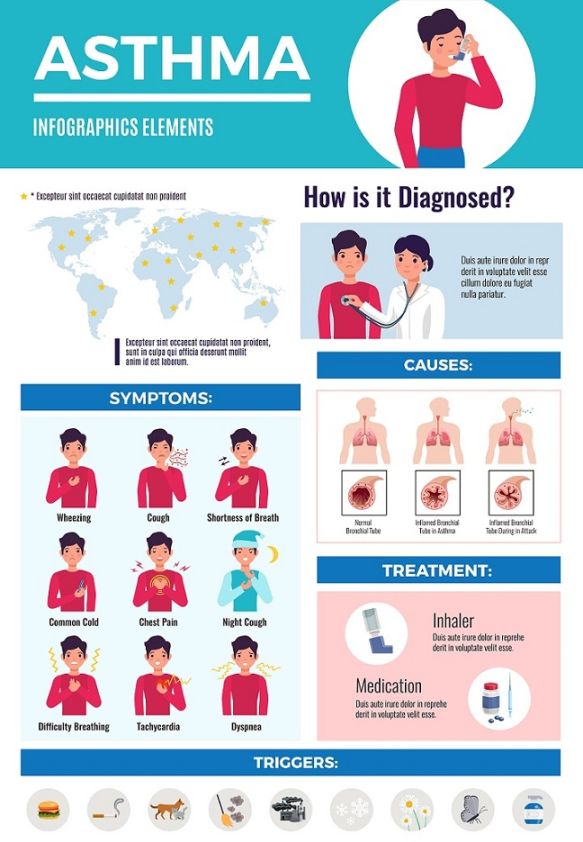Food and Food Additives Trigger Asthma
If you have food allergies, then there are many chances that you will experience asthma with serious conditions. Food allergies can cause asthma without other symptoms. The most common food associated with allergic symptoms is as follows:
- Milk
- Tree Nuts
- Wheat
- Salads
- Fresh fruits
- Eggs
- Peanuts
- Soy
Heartburn and Asthma
Serious acid reflux and asthma frequently go connected at the hip. Up to 89% of individuals with asthma additionally have serious acid reflux; you may hear your primary care physician call it gastroesophageal reflux malady or GERD. It usually happens at night when you’re resting. Usually, a valve prevents stomach acids from backing up into your esophagus, the tube food goes down when you eat. When you have GERD, this valve doesn’t work as it should. The stomach acids reflux, or back up, into the esophagus, and if the acids reach your throat or airways the irritation and inflammation they cause an asthma attack.
If the doctor diagnoses this problem, he surely recommends specific tests or suggests proper medications and helps to decide what to eat or what not to eat.
Sinusitis or Respiratory Infections
Sinus infection can also cause asthma. Much like asthma causes inflammation in the lining of your airways, sinusitis causes inflammation in the membranes that line your sinuses. If an individual has asthma then, sinuses will get inflamed, and then it can also destroy airways as well. Early treatment of sinus infection can save from the symptoms of asthma.
Weather
Cold air and changes in temperature and humidity can cause an asthma attack.
Strong Emotions
There are various strong emotions which can also bring asthma attacks as well. Stress can cause asthma. Anxiety, yelling, stress, crying, anger, or laughing hard can also bring on an asthma attack.
Allergies
Allergies and asthma often come together. In some people, skin and food allergies can cause asthma symptoms. The same substances that trigger your hay fever symptoms, such as pollen, dust mites, and pet dander, may also cause asthma signs and symptoms. This is called allergic asthma or allergy-induced asthma.
Exercises
A heavy workout can also cause an asthma attack. Because a heavy workout can cause airways to narrow so that an individual faces difficulty to breathe. Experience is often the main cause of asthma. Chest tightness and cough are the main symptoms if a person is having asthma during exercises. Mostly people face trouble breathing the first five to fifteen minutes during a workout. But in most people, these symptoms go away in the next 30 to 60 minutes of exercise. But in some of the people, these symptoms didn’t go away in 30 to 60 minutes. A slow warm is the only solution to avoid heavy symptoms of an asthma attack.
Smoking
Smoking is one of the other reasons which can be cause an asthma attack. In Fact, it could be more likely to get asthma. If you smoke with asthma, it may make symptoms like coughing and wheezing worse and makes you more difficult to breathe. It is most dangerous for mothers who have a pregnancy, smoking can cause the baby’s lung function and asthma. If you have asthma and you’re a smoker, quitting smoking is the most important step you have taken first. Quitting smoking is the best way to save your lungs from destruction and help you to do better medication of asthma.
Medication
People, who have asthma, may also be having some other trouble with other medications like anti-inflammatory drugs, high blood pressure, and glaucoma. Always talk to your doctor if you have any of these diseases along with asthma especially when you are about to change your medication.
Types of Asthma
There are several types of asthma
Childhood Asthma
Asthma is very common in children than in adults. It is the most common chronic condition in children. There are some common symptoms of childhood asthma such as:
Allergens
Cigarette smoke,
Respiratory infections and colds
Stress
Exercise
Exposure to cold air
Air pollution
Adult-Onset Asthma
The asthma attack can occur with anyone whatsoever a person is in age, even during adulthood. Some are the factors that affect the risk of developing asthma in adulthood include:
- Smoking
- Stress and anxiety
- Obesity
- Hormonal factors
- Allergies
- Respiratory illness
Occupational Asthma
The symptoms of occupational asthma are cough, shortness of breath. It can be caused by breathing in chemical fumes, gases, dust, or other substances on the job.
Treatment of Asthma
It is important to know the most effective treatments for short-term relief and long-term control in the case of any individual proves that he has asthma. It is also important to know the asthma treatment which will definitely help you and your asthma doctor confidently manage your asthma symptoms daily. It will help you to recognize the symptoms of an asthma attack to call the doctor to avoid any kind of asthma emergency. Here there is some asthma treatment.
Use of Inhalers
Rescue inhalers are also called quick-relief inhalers which are medication you breathe in. it is used to ease asthma symptoms when it happens. Inhalers help to relax the muscles that tighten around the airways. Inhalers help to open them up so, in this, a patient can breathe easier. If any individual uses this kind of medication for more than two days a week, it is recommended that he should visit the asthma specialist. These medications include:
- Short-acting beta-agonists, this is the first choice for quick relief of asthma symptoms.
- Anticholinergics, it helps to reduce mucus in addition to opening your airways.
- Oral corticosteroids help in lower swelling in your airways.
- Combination quick-relief medicines, If a patient can’t use an inhaler, then he gets them from a nebulizer, a machine that helps to breathe in the medicine.
Preventative, long-term Medications
There are several medications which can help to prevent asthma attack for the long term. It can help to reduce swelling and mucus in your airways. As a result it can help in breathing. In include:
- Inhaled corticosteroids: inhaled corticosteroids can prevent swelling. It can also reduce mucus in the lungs. It is considered to be the most effective long-term control medicine.
- Inhaled long-acting beta-agonists: a person can take this medicine along with inhaled corticosteroid if he has asthma. It helps to open the airways by relaxing the smooth muscles around them.
- Combination inhaled medicines: which pair an inhaled corticosteroid with a long-acting beta-agonist. This is an easy way to take them together.
- Biologics: Biologics treatments are expensive long term treatment. It is recommended a patient should go for this treatment when the medications don’t work. Biologics target a cell or protein in the body to prevent airways inflammation.
- Leukotriene modifiers: it helps to relax the smooth muscles around your airways and ease swelling. You can take them as pills or liquids.
- Cromolyn: it is a non-steroid medicine that comes in an inhaler. It helps to prevent the airways from swelling when they come into contact with an asthma trigger.
- Theophylline: it is a tablet, capsules, solution, or syrup to take by mouth. It can help to relax the smooth muscles that narrow the airways.
- Oral Corticosteroids: if no other medicine can get your asthma attacks under control, and then the doctor might have you take these medications for a couple of weeks. They come in pills or liquids.
Alternative Asthma Treatments
There are some alternative asthma treatments that can help to reduce the triggers of these diseases.
Breathing experience: Breathing exercises can lower the amount of medication which can help to reduce the symptoms of asthma.
Natural remedies: there are several herbal and natural remedies that can help to improve the asthma symptoms like black seed oil, caffeine, chlorine, and pycnogenol.
Natural Remedy Options for Asthma Treatment
If you have severe asthma and your regular medications don’t seem to be providing the relief you need, then there are some natural remedies can help you in this regard. These natural remedies can help you to reduce the amount of medication and can improve the quality of your life. Here are some natural asthma therapies you can try.
Papworth method
This is the technique of breathing and relaxation that has been used since the 1960s to help with asthma. There are some breathing patterns involved in it using nose and diaphragm. If you apply these breathing patterns to various activities that may cause your asthma to flare-up.
Garlic and Ginger
Food that you eat every day might be a safer route to a natural remedy. Ginger and garlic both have anti-inflammatory properties and are commonly used to manage cardiovascular disease. Asthma is an inflammatory disease, garlic may be able to help relieve your symptoms.
Honey
Honey is used in cold remedies to help soothe and throat and reduce coughing. Honey can be mixed with a hot beverage like herbal tea to prove relief for our symptoms.
Omega-3 oils
Omega-3 oils have proved that it has many health benefits and it is found in fish and flax seeds. It can be helpful to decrease airway inflammation and improve lung functions in people with severe asthma. But on the other hand, high doses of oral steroids can block the beneficial effects of omega-3 oils. It would be good if you consult with the doctor before taking the natural remedy to avoid asthma symptoms.
Meditation and Yoga
As we know, stress is a key trigger of asthma attacks, and a regular yoga or meditation practice can reduce the threats of asthma in serious conditions. Yoga is incorporates stretching and breathing exercises which help boost flexibility and increase your overall fitness. Yoga also helps to decrease stress which may trigger your asthma.
Hypnotherapy
Hypnotherapy may help facilitate muscle relaxation, which is helpful to decrease the symptoms of asthma. It is a therapy that is used to make a person more relaxed and open to new ways to think. Hypnotherapy is the best option for the natural remedy of asthma treatment.
Biofeedback
Biofeedback is an approach that uses electronic monitoring devices to help you to learn how to manage your body’s physical response. The study has shown that biofeedback helps asthma patients improve airway flow and lung function.
Steam Bath
Warm steam is a common remedy for opening airways when people are suffering from a common cold. A steam bath can helpful when asthma symptoms pop up.



